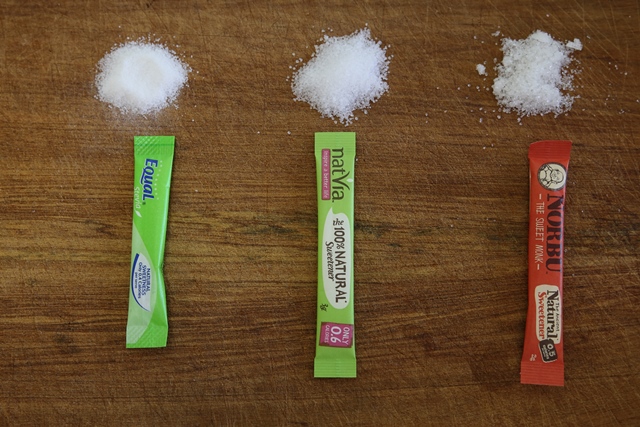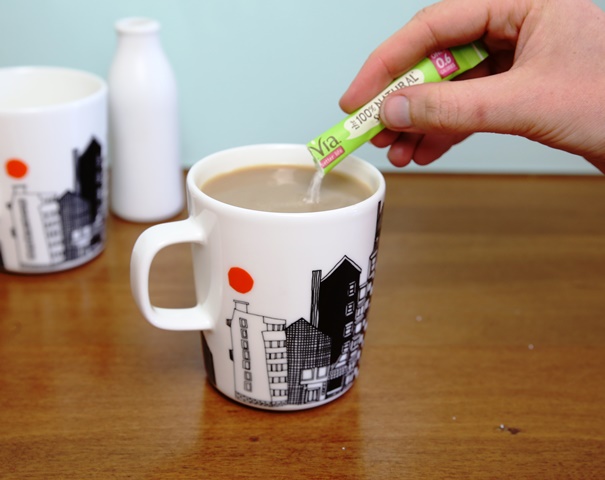Product Review: Stevia and monkfruit sachets side-by-side
Written by Catherine Saxelby
on Friday, 29 November 2013.
Tagged: artificial sweeteners, healthy eating, sugar, sugar substitutes, sweetener

Use of the sweetener stevia is becoming more widespread and a host of new brands (like Natvia) are coming on the market. What's more, existing sweeteners are being reformulated to contain stevia in place of aspartame or saccharin (like Equal). So we figured it was high time to taste test stevia products in convenient sachets. And we threw in a new sweetener called monk fruit (Luo Han Guo) as a comparison.
With claims of 100% natural, no nasties, 95% fewer calories than sugar, low GI, low carbs, and no bitter aftertaste, they all sound too good to be true.
Stevia products are also available as loose powders in large containers so they can be used as a substitute for sugar, for instance in baking. However, these sachets are clearly meant to be added to our daily cappuccinos or tea, so that's how we decided to taste test them.
One sachet per mug of English Breakfast tea with milk. We followed up by taste testing them in home-made lemon cordial (lemon juice, sweetener dissolved in two tablespoons of hot water and iced water) and found the same results as for the tea.
Appearance and taste

'Equal with Stevia' looked very artificial and looked far from normal white sugar. The granules were incredibly fine and off-white in colour. It looked more like table salt than sugar. Natvia looked the best of the three as it looked the most like sugar of the three with its large white granules resembling whole sugar.
Monk fruit (Norbu) was the most disappointing. It had large coarse glassy crystals that stuck together so it did not pour smoothly out of the sachet. You usually found there was some left behind in the sachet that was stuck to the bottom. This defeats the purpose of a convenient free-flowing single sachet as you really need to shake and squeeze the sides of the sachet to get it all out.
Taste 3/10

For us it ruined the taste of the tea and it was difficult to get through the whole mug. We don't usually have sugar with our tea so perhaps we were particularly sensitive to the sweetness. Even so this stevia is much more overpowering and not equivalent to one teaspoon of sugar.
If you are trying to wean yourself off sugar then starting off with this substitute might not be the wisest decision. You will be heading back to white sugar in no time.
Taste for Equal: 3/10
Natvia was certainly the best in taste. It was the most similar in taste to normal sugar compared with the others, however it still did not have that clean pure sweetness that sugar has. The level of sweetness was spot on, sweet enough but not overpowering unlike Equal but it still had some artificial undertones. The Natvia poured out of the sachet with ease and initially it appeared to dissolve well into the tea. However as we neared the end of our cuppa, we spotted sweet crunchy granules at the bottom and the side of the mug where we had been drinking. Clearly, the stevia had not dissolved completely and it made the last few sips of the tea really unpleasant. Much too sweet and the coarse granules entering your mouth was a little off-putting. The fact that Natvia didn't completely dissolve let it down. Other than that, we would have no issue recommending it as a sugar substitute for people wishing to lower their sugar intake.
Taste for Natvia: 5/10
The Norbu monk fruit was a complete failure in terms of taste. In the mug of tea we could not taste the monk fruit at all! It was as if there was none even present. So in terms of taste as a sugar substitute we were compelled to give it zero. One sachet does not not add any sweetness to a cup of tea and therefore defeats its purpose. You'd be really annoyed if you bought this to have as a sugar substitute and would be tempted to return it to the supermarket.
Taste for Monk fruit: 0/10
Nutrition: 13/20
One sachet weighs from 1.5 to 3 grams of the sweetener and supplies a tiny 1 or 2 kilojoules (0.4 to 0.6 of a Calorie) which is negligible. So, apart from the monk fruit which wasn't sweet at all, they live up to the claim that they give you the sweetness of a teaspoon of sugar without any kilojoules which is their attraction for those on a weight loss diet or with diabetes. There's no protein, fat or carbohydrate.
One sachet is meant to be equivalent in sweetness to one level teaspoon of sugar.
Ingredients
None of the sweeteners are pure stevia or pure monk fruit. Their main ingredient is erythritol which accounts for around 98 per cent of the powder, along with flavours plus a cellulose powder as an anti-caking agent. The amount of stevia is so small, it needs the erythritol to make it manageable and spoon-equivalent to sugar.
Ingredients Equal
ERYTHRITOL, STEVIOL GLYCOSIDE 1.4%, ANTICAKING AGENT (CELLULOSE), NATURAL FLAVOURINGS.
Ingredients Natvia
ERYTHRITOL, STEVIA (REB A)
Ingredients Norbu
ERYTHRITOL, FLAVOUR, MONK FRUIT – LUO HAN GUO
What's erythritol?
Erythritol is a sugar alcohol in the same group as sorbitol and xylitol (called sugar alcohols or polyols) which is used to add sweetness and body to diet foods such as confectionery or diet chocolate. Almost all of it is excreted unchanged in the urine, so it has no effect on blood glucose levels which makes it useful for people with diabetes. It's low GI.
The only downside is that if you eat a lot, it can cause wind or diarrhoea, which explains the laxative warning you'll read on the label: "Excess consumption may have a laxative effect".
Does not cause dental decay.
Convenience 10/10
Too easy! Nothing to prepare, no need to add anything. Just rip the top off the sachet and pour in.
Sustainability 2/10
Monk fruit and Natvia were printed on recycled matte paper but it is difficult to give a rating as there is not a lot of information. Equal was manufactured in Germany, packaged in the Netherlands then imported and distributed into Australia. We couldn't tell where the others came from as they just said "made in Australia from local and imported ingredients". We can assume that the active sweetener has been imported and therefore have given it a low rating of 2/10.
Bottom line
If forced to choose we'd pick Natvia for its superior taste but really none of them is as pleasantly sweet as ordinary sugar. However, they would be useful if you have diabetes or want to lose weight and know you can't survive without something sweet in your tea or coffee. Monk fruit was a great disappointment, as we found it had no sweetness. Don't waste your money on a whole box of sachets. We think ultimately it may be better to halve the amount of sugar you use per cup and not worry about a sweetener altogether.
Overall Score 2.5 Apples

Total score = 28/50
Website of manufacturers:
www.clubequal.com (no longer around)
norbusweetner.com.au (no longer around)
Tasters: Catherine Saxelby, Daisy Coyle (student)
Foodwatch
The Good Stuff
The Boring Stuff
© 2025 Foodwatch Australia. All rights reserved
Website by Joomstore eCommerce





